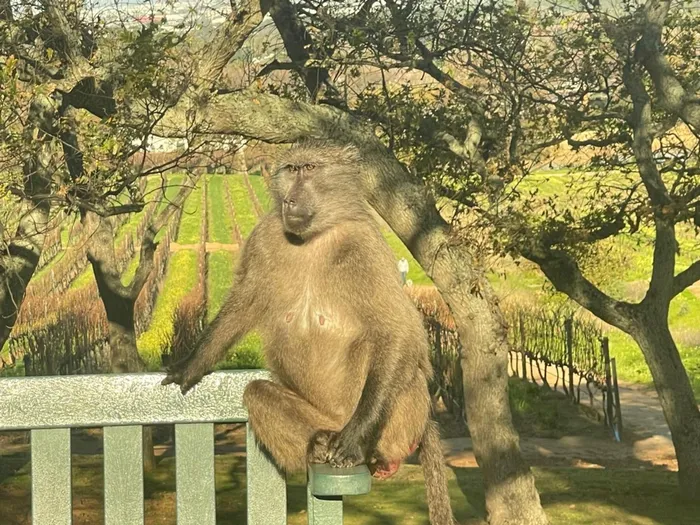Petition urges City to continue urban baboon programme

A baboon spotted at Groot Constantia. Residents fear similar incursions to urban and residential areas will be more frequent without monitors. Picture: Daina De Agrela
A petition for the City to extend its contract with NCC Environmental Services, a private company managing the urban baboon programme, is gaining momentum.
However, the City says the programme, which has been managing human-baboon interface for 14 years, will end once its current contract with NCC runs out on December 31. This will see a removal of monitors who have been keeping baboons in natural areas and out of the urban edge.
With less than six months left, there is growing concern that the Baboon Strategic Management Plan, which was positioned to replace the urban programme, will not be ready for roll out by the end of this year.
The suite of tools from the plan that were discussed during public meetings held by the Cape Peninsula Baboon Management Joint Task Team (JTT) with baboon-affected communities in June are widely considered long term (“Residents oppose rates hike for baboon plan” Bulletin, June 27)
Several residents have questioned the JTT on what happens come January 1.
According to Rob McGaffin, executive director: Spatial Planning and Environment, City of Cape Town, the idea of the city extending its tender with the NCC is highly problematic. The current contract is no longer fit for its purpose and the City’s supply chain policies require it go out on tender on a competitive basis.
“Baboon management is not the sole mandate of the City. All three authorities have mandates in this space. So from a mandate point of view, supply chain point of view, a budget point of view, and the nature of the current contract, for us to extend the contract is very, very difficult and problematic.”
He says the work of the rangers in its current form is coming to an end. However, the JTT is looking at the functions of the contract and how it could potentially fill in as many of these functions as possible.
He adds that the JTT is currently investigating what would be the role and function of monitors in the management plan, the rules and guidelines by which they need to comply, how monitors will be funded, and the instrument through which funding would take place.
Julia Wood, City’s manager: Biodiversity Management, said the current urban baboon programme is not effective. The number of injuries and incidents of baboons on roads has increased substantially. The baboon population has gone down by 37 overall across the peninsula – most of these fatalities have been human induced.
To deal with these fatality cases, the Cape of Good Hope SPCA have had to increase their forensic capacity, says Jon Friedman, a wildlife inspector.
He says an AK-47 bullet core was dug out of a female baboon’s spine, after a bullet wound to the chest left it paralysed on a Rhodes Drive property (“Baboon put down after shooting” Bulletin, April 13).
“Constantia has become a microcosm of the wider problem of people shooting baboons. Interestingly, the area has the largest number of licensed AK-47 weapons in the entire peninsula. Everybody knows who the shooters are in every neighbourhood, but they're protected.
“The SPCA , it's single-handedly frustrated, because we just can't get any of the people that will offload a firearm into an animal. They know that Constantia is well aware of what they do usually, and they've got the money to fight legal cases for the next 10 years,” Mr Friedman said. He urged anyone with information of animal cruelty to bring it forward to the SPCA.
Concerned for the welfare of the baboons, Daina De Agrela, a Stonehurst Estate resident, started the petition on Sunday June 23. It has already garnered close to 1000 signatures but she hopes to gain over 20 000.
“Without the baboon monitors, our baboons are at a risk of danger like being shot, knocked over and killed by people driving over the speed limit as well as dog induced injuries,” the petition states.
Ms De Agrela told the Bulletin, the City’s decision to end the contract is illogical and a poor choice that will severely impact baboon’s welfare.
Several people who have added their signature to the petition agree.
“Without the NCC monitors in place, the baboons, who are already targeted by intolerant residents, will have no protection against raiding urban areas thereby exposing them to even higher risk. Not to mention the potential loss of jobs, the Western Cape brags about addressing joblessness but yet do not want to renew NCC's contract?” says Stacy Edwards.
“I live in a suburb close to where the Slangkop troop visit often and the monitors are an invaluable resource in getting the troop out of the suburb as quickly as possible and getting them back to the mountainside. Without the NCC monitors baboons will get shot by intolerant residents using guns and eventually someone will get hurt by a stray pellet or bullet too. I am petitioning local government to keep this contract in place as a resident affected,” says Toni Cheiman.
Related Topics: